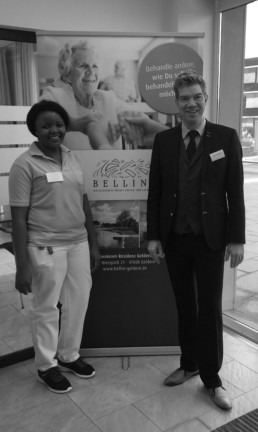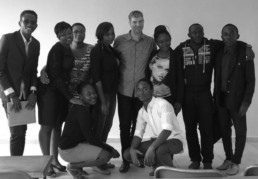Education gives you a future!
Cultural awareness
Attracting foreign applicants for care roles
You have successfully completed nursing training or a nursing degree in your home country, may already have professional experience in nursing and are interested in one of the following items:
Would you like to have your foreign nursing qualification recognised as a registered nursing care specialist in accordance with the Nursing Professions Act?
Would you like to learn specialist professional German and/or improve your existing language skills?
Would you like to work as a caregiver in Germany?
Have we sparked your interest?
Then apply to have your foreign nursing qualifications recognised, or to upgrade them.
Applicant registration/application procedure
- Personal interview
- Tracking language quality
- Decision making/registration
- Employment contract as a nursing assistant
- Issuance of visa, issuing residence/work permit
- Participation in course for upgrading professional qualifications
Summary report
A foreign student from the sponsor organisation's perspective
Effective as of 1 October 2018, Ms Milene Meneguefack started her training as a certified geriatric nurse at BELLINI Senioren-Residenz Geldern GmbH. In this connection, Mr Ingo Heysterman, managing director of the heysterman academy for health and social affairs in Alpen, pointed out that continuous socio-educational support during training in combination with integration services serve as guarantors of success. To this end, both institutions developed a common system of practical instruction, which, among other things, enabled Ms Milene Meneguefack to effectively transfer theory into practice over the long term and to quickly connect to the nursing team and to Ms Koslowski, her practice manager.

Cultural awareness through intercultural competence
Globalisation is bringing the world ever closer together. Our society is also increasingly shaped by cultural diversity. We live in close proximity with people of different cultures. Many migrants are our customers and we encounter one another in everyday social life. We communicate with them, exchange ideas and undertake things together. Dealing with diversity is always both an opportunity and a challenge for people of different cultures. Every individual is required to handle diversity with sensitivity.

- Cultural awareness
- tolerance, multicultural society
- intercultural communication and openness
Raising awareness, providing information, understanding and acting
Recognising diversity and appreciating cultural differences
One’s own cultural influences are perceived, reflected upon and set in relation to those of other cultures. Participants recognise their own prejudices and stereotypes and become aware of their own “cultural glasses”. Specific background knowledge about migration is imparted in order to develop expertise. Encountering a “foreign” culture can create stress. The way in which people express themselves and communicate with each other often depends on their cultural background. By communicating the different day-to-day realities, we help to better identify and deal with culture-related modes of communication and patterns of interpretation.
Combine different cultural needs in your daily team/organizational work
We would be pleased to accompany you within the scope of our individual/team coaching during the introduction of an operational culture management system and/or benefit from our
Advanced training to become a
“Transcultural Coach in Healthcare”
ATTRACTING FOREIGN TRAINEES FOR CARE ROLES
Summary report on a foreign student from a sponsor organisation's perspective Effective as of 1 October 2018, Ms Milene Meneguefack started her training as a certified geriatric nurse at BELLINI Senioren-Residenz Geldern GmbH. In this context, In this connection, Mr Ingo Heysterman, managing director of the heysterman academy for health and social affairs in Alpen, pointed out that both training and support in finding accommodation or in dealing with the authorities belong together/should be a priority. Both institutions developed a common system of practical instruction, which, among other things, enabled Ms Milene Meneguefack to effectively transfer theory into practice over the long term and to quickly connect to the nursing team and to Ms Koslowski, her practice manager.



